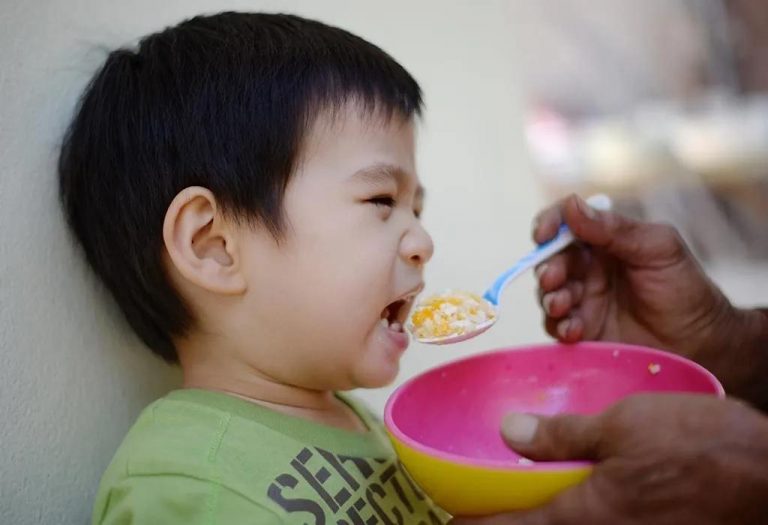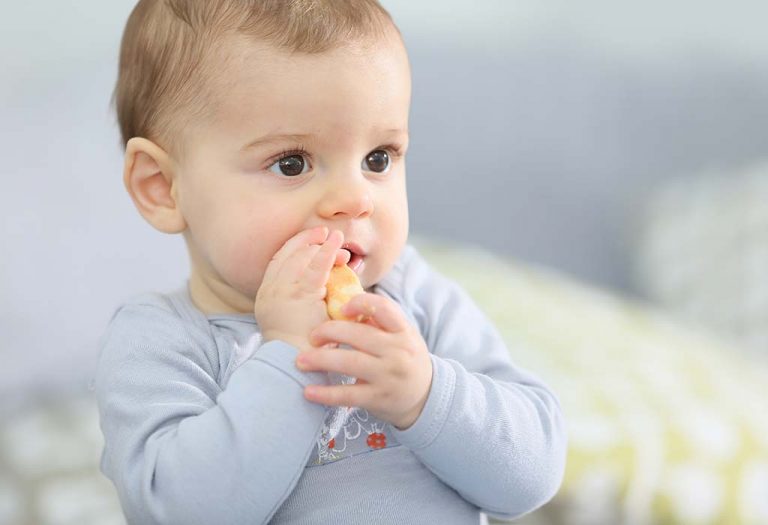How to Make Fruit Purees for Babies
Fruit purees are easy-to-make, easy-to-eat and are packed with nutrients that are vital for the overall development of the baby. But if you keep serving the same kind of puree every other day, you can expect some baby tantrums. In this article, we will provide some tips on how and when to start serving them.
Video: 5 Delicious Fruit Purees for Babies (With Recipes)
When and How to Introduce Fruit Puree to Babies?
Fruit purees are generally easy to digest. Yet, you need to know when it is best to introduce fruits in your baby’s diet just like all other solid food. You could start with one fruit, one spoon and two times day. Increase the portions gradually.
As a thumb rule, you can introduce it gradually at around 6-8 months. This is the time when the baby is usually breastfeeding lesser. So, they need other food items in their diet to get wholesome nutrition.
Tips for Making Fruit Puree
To make the most out of a fruit puree, follow the tips below to learn how to make fruit purees for babies.
- Purees must be always made with ripe fruits because that makes it sweeter in taste and easier to blend.
- Every fruit has its own nutritive value. You should try to include various fruits you can make a puree with, so that baby gets balanced nutrition.
- First, try a single fruit puree and then slowly move on to fixed fruit purees.
- Avoid oranges, pineapples and passion fruits till the baby is 12 months because they may cause allergies in younger babies.
- Do not boil the fruits because that may spoil some of its nutrients. You can steam them to retain maximum nutrition.
Easy Fruit Puree Recipes for Baby
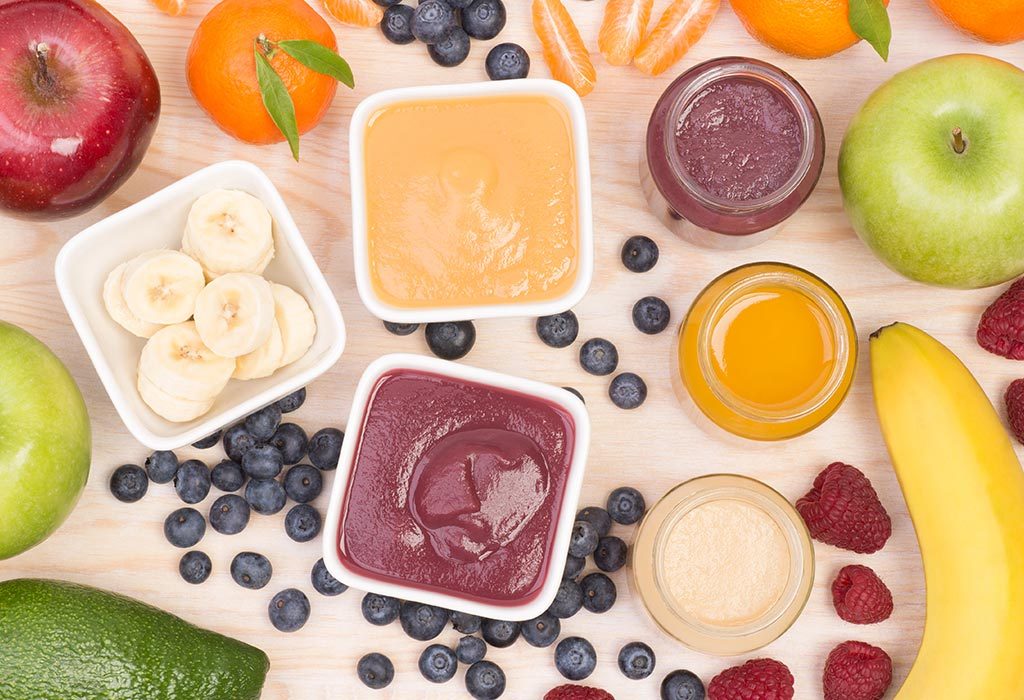
As we have already mentioned, start your babies ‘fruity’ journey with one fruit. After your baby becomes tolerant to one type of fruit you could choose another and then move on to mixed fruit purees.
1. Chikoo or Sapota Puree
Soft, sweet sapota is ideal for over 7-month old babies. It is rich in vitamin A and C.
Ingredients
- 1 small sapota
- Breast/formula milk.
How to make
- Peel and cut sapota into pieces.
- De-seed it.
- Mash it in the blender.
- You may add breast milk/formula milk.
2. Dates puree
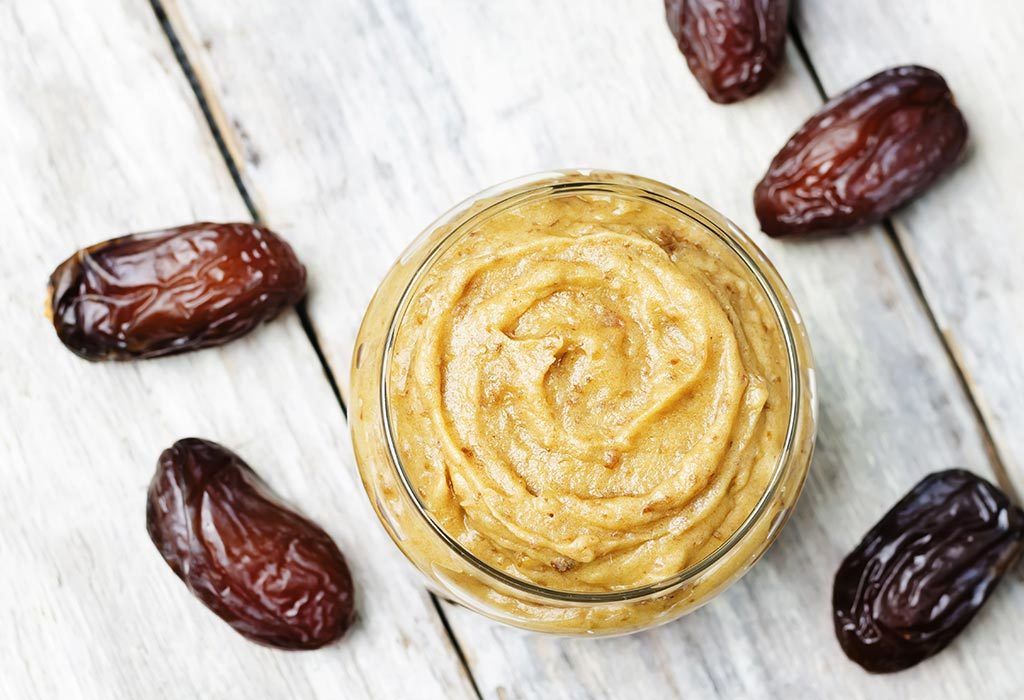
Date purees are suitable for over 8-month babies. They are rich sources of B complex vitamins and minerals like selenium, copper, potassium, magnesium, manganese, calcium and iron.
Ingredients
- Few fresh dates
- Breast milk/formula
How to make
- De-seed the dates.
- Dates need some intensive cooking with 4-5 whistles in a pressure cooker to make them soft enough for a puree.
- Blend the boiled dates in a processor.
- Add some breast milk/formula.
3. Papaya and Ripe Guava Puree
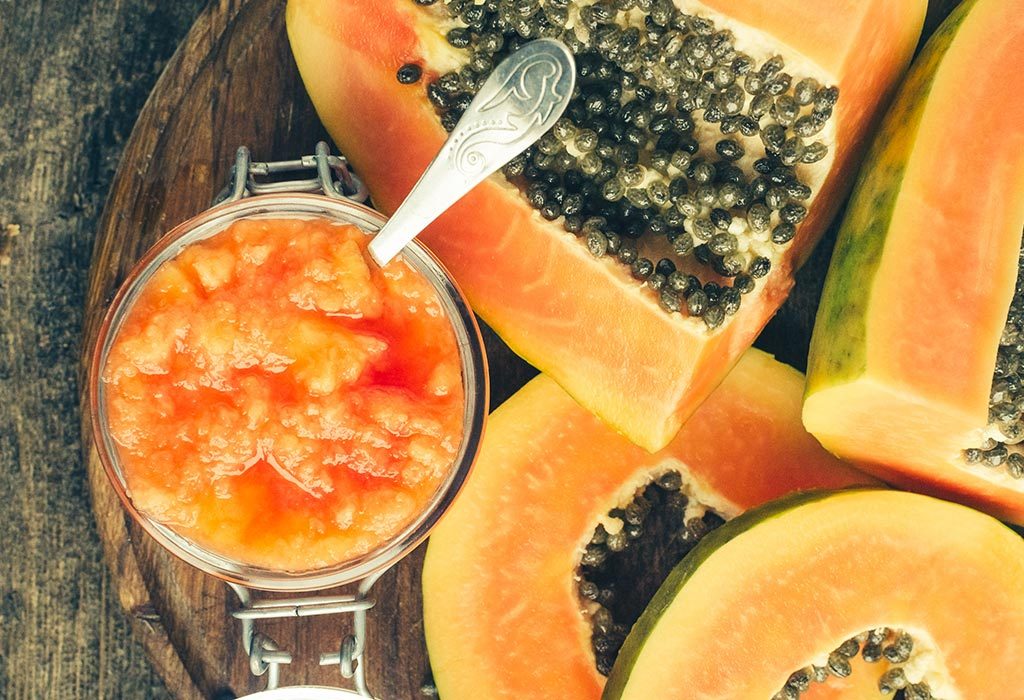
This mixed fruit puree for babies is a super nutritious combination, especially for babies over 8-months. It contains vitamin A much more than in an orange and a greater amount of vitamin C than most other fruits. It also has protein, fibre, and folate. It is often called the ‘queen of fruits’ or ‘super fruit’ because it has a greater variety of nutrients than most other fruits. That makes it an essential part of baby food.
Papayas are a great source of antioxidants like carotenes, vitamin C and flavonoids. It also contains vitamin B, folate, pantothenic acid, potassium, copper, and magnesium. It has dietary fibre and so it is easy to digest. It was called the “fruit of the angels” by Christopher Columbus because of its goodness and deliciousness.
Ingredients
- Half a guava (ripe)
- Few pieces of papaya (ripe)
How to make
- Wash, peel, chop both the fruits into small pieces.
- De-seed the papaya.
- Take greater portions of papaya and lesser guava pulps.
- Blend it in a food processor.
4. Pear and Plum Puree

This combination can be introduced when the baby is 6 to 8 months. Plums are a mild laxative so they are not recommended in the first six months.
Pears contain Vitamins A, C, folate and the minerals potassium, phosphorus, magnesium, and calcium. Plums are a source of sugar, protein, vitamin C and K. Since both these fruits contain a high amount of fibre, this puree can relieve constipation in your baby.
Ingredients
- A small portion of pear and few plums.
How to make
- Wash, peel, and cut the pear into small pieces.
- Wash, pit and cut the plums into quarter size pieces.
- Steam it till tender.
- Mash them in the food processor.
- Add water for a finer puree.
- Add more water/breast milk/formula to make it runny.
5. Grape, Watermelon and Lemon Puree
This puree can keep baby full for a long time because each grape is around 5 calories.
It also packs in nutrients from three great sources. Grapes are not calorie rich but they also contain vitamin A, C, B-6 and K and minerals like potassium, magnesium, calcium, iron. It also contains resveratrol and fibre. Watermelon has a good amount of vitamins A, B6 and C, lycopene, antioxidants, amino acids and some potassium. Lemon is known for its high vitamin C content. It also contains folate and potassium.
Ingredients
- Green seedless grapes.
- Watermelon juice.
- A slice of lemon.
How to make
- Wash the fruits.
- Peel the grape skin with a knife.
- Cut the grape into half.
- Mash them in a blender.
- Add a little lemon, too much can make it sour.
- Add some watermelon juice to make a runny consistency.
- Add sugar.
- Do not add milk/breast milk because the lemon will curdle it.
- You may also freeze the grapes beforehand for a cold puree if you live in a hot climate.
These purees are full of pure, natural goodness that is perfect for the healthy development of your baby.
Apple Puree for Babies
Banana Puree for Infants
Carrot Puree for Babies





